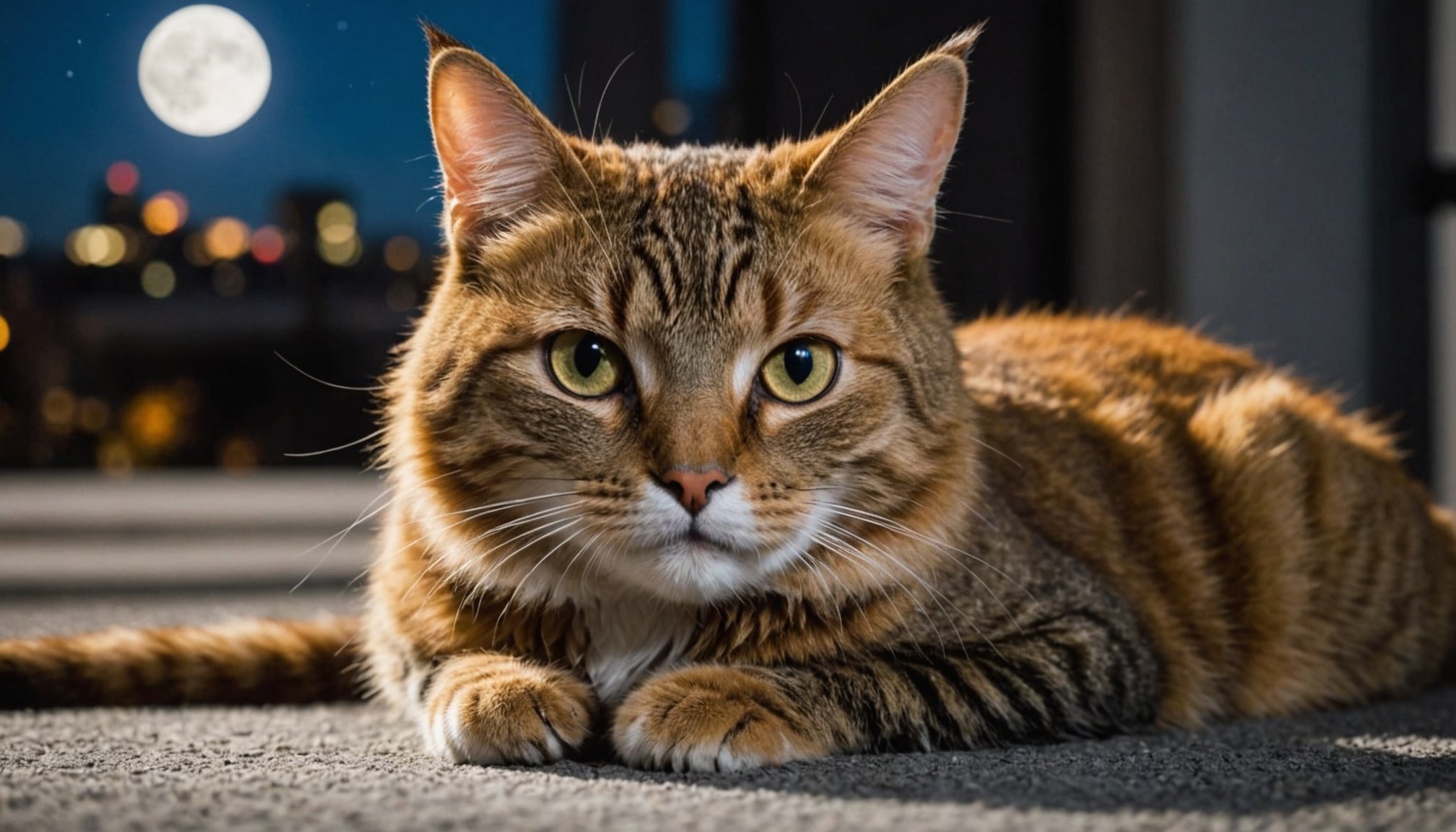Adjusting Your Cat’s Nocturnal Habits to Fit Your Lifestyle: Effective Strategies for a Harmonious Home
If you’re among the many cat owners who find themselves waking up in the middle of the night to the sound of meowing or pouncing, you’re not alone. Cats are naturally nocturnal, but with the right strategies, you can help adjust their sleep patterns to better align with your own. Here’s a comprehensive guide to help you and your feline friend enjoy a more peaceful and synchronized lifestyle.
Understanding Your Cat’s Nocturnal Nature
Before we dive into the strategies, it’s essential to understand why cats are nocturnal in the first place. In the wild, cats are predators that hunt at night, and this natural instinct is still present in domesticated cats. However, this doesn’t mean you can’t influence their behavior to some extent.
Dans le meme genre : Stress-Free Strategies to Help Your Cat Embrace Nail Trimming!
Why Cats Are Active at Night
- Hunting Instinct: Cats have an innate hunting instinct that makes them more active during the night.
- Sleep Patterns: Unlike humans, cats don’t sleep for long stretches. Instead, they take multiple short naps throughout the day and night.
- Attention Seeking: Sometimes, cats become active at night simply because they are seeking attention or playtime.
Adjusting Feeding Times
One of the most effective ways to influence your cat’s nocturnal habits is by adjusting their feeding times.
Feed the Largest Meal Before Bedtime
Feeding your cat the largest meal of the day before bedtime can help them feel fuller and more content, reducing the likelihood of them waking you up for food during the night. As the American Association of Feline Practitioners suggests, “If your cat wakes you at night to be fed, feed the largest meal prior to bedtime”.
A lire en complément : Creating a Stress-Free Feeding Zone: Expert Tips for Cats with Social Eating Anxiety
Example Feeding Schedule
Here’s an example of how you might adjust your cat’s feeding schedule:
| Time of Day | Meal Size |
|---|---|
| Morning | Small |
| Afternoon | Medium |
| Evening | Large |
By following this schedule, you can help your cat feel more satisfied and less likely to wake you up during the night.
Providing Engaging Activities During the Day
Keeping your cat active and engaged during the day can help them sleep better at night.
Playtime and Exercise
Engage your cat in playtime activities such as chasing a laser pointer, playing with feather toys, or using interactive puzzle toys. This will help them expend their energy during the day rather than at night.
Creating a Stimulating Environment
Ensure your home is stimulating enough to keep your cat engaged. Here are some ideas:
- Vertical Space: Provide cat shelves or climbing structures to keep them active.
- Scratching Posts: Offer scratching posts to help them maintain their nails and stretch.
- Window Perches: Allow them to observe the outdoors from a window perch.
Ensuring a Comfortable Sleeping Area
A comfortable sleeping area can significantly impact your cat’s sleep patterns.
Choosing the Right Cat Bed
Select a cat bed that is comfortable and inviting. Here are some tips:
- Soft and Cozy: Opt for a bed with a soft, plush material.
- Quiet Location: Place the bed in a quiet, undisturbed area of your home.
- Warmth: Consider a heated cat bed, especially for older cats who may appreciate the extra warmth.
Creating a Sleep-Conducive Environment
Make sure the room where your cat sleeps is conducive to sleep. Here are some suggestions:
- Dim Lighting: Keep the room dimly lit to mimic natural night conditions.
- Quiet: Ensure the area is quiet and free from noise disturbances.
- Cool Temperature: Maintain a comfortable temperature; cats prefer cooler environments for sleep.
Managing Attention and Interaction
Sometimes, cats become active at night because they are seeking attention or interaction.
Setting Boundaries
Establish clear boundaries and avoid interacting with your cat during the night. If your cat wakes you up, ignore them until morning or provide a quick, minimal interaction to discourage them from continuing the behavior.
Providing Alternative Attention
During the day, spend quality time with your cat. This can include playtime, grooming, or simply sitting together. Here are some ways to provide alternative attention:
- Playtime Sessions: Schedule regular playtime sessions during the day.
- Grooming: Spend time grooming your cat, which can be a calming and bonding experience.
- Quiet Time: Spend quiet time with your cat, such as reading or watching TV together.
Additional Tips for Older Cats
Older cats may have different needs and behaviors compared to younger cats.
Health Considerations
Older cats may have health issues that affect their sleep patterns. For example, arthritis can make them more active at night due to discomfort. Consult with your veterinarian to address any underlying health issues.
Adjusting the Environment
For older cats, ensure the environment is more comfortable and accessible. Here are some tips:
- Easy Access: Place their bed and litter box in easily accessible locations.
- Warmth: Provide extra warmth, such as a heated bed or a warm blanket.
- Quiet Space: Ensure their sleeping area is quiet and undisturbed.
Practical Insights and Actionable Advice
Here are some practical insights and actionable advice to help you adjust your cat’s nocturnal habits:
Consistency is Key
Consistency is crucial when adjusting your cat’s behavior. Stick to the new routine and avoid giving in to their demands during the night.
Be Patient
Changing behavior takes time. Be patient and give your cat time to adjust to the new routine.
Monitor Progress
Keep a journal or log to monitor your cat’s progress. This will help you identify what works and what doesn’t.
Table: Comparing Different Strategies for Adjusting Nocturnal Habits
| Strategy | Description | Pros | Cons |
|---|---|---|---|
| Adjusting Feeding Times | Feed the largest meal before bedtime | Helps cat feel fuller and more content at night | May require adjusting your own schedule |
| Providing Daytime Activities | Engage in playtime and provide stimulating environment | Helps expend energy during the day | Requires time and effort to engage your cat |
| Ensuring Comfortable Sleeping Area | Provide a comfortable and quiet sleeping area | Promotes better sleep for your cat | May require investment in a new cat bed or adjustments to the room |
| Managing Attention and Interaction | Set boundaries and provide alternative attention during the day | Reduces attention-seeking behavior at night | Requires discipline to ignore your cat at night |
| Special Considerations for Older Cats | Address health issues and adjust the environment for comfort | Improves quality of life for older cats | May require more frequent veterinary visits and adjustments to the home |
Quotes from Experts
- “If your cat wakes you at night to be fed, feed the largest meal prior to bedtime.” – American Association of Feline Practitioners.
- “Providing engaging activities during the day can help them sleep better at night.” – Animal Photography Workshops.
Adjusting your cat’s nocturnal habits is a process that requires patience, consistency, and the right strategies. By adjusting feeding times, providing engaging daytime activities, ensuring a comfortable sleeping area, and managing attention and interaction, you can help your cat sleep better at night and improve the overall harmony of your home.
Remember, every cat is different, so it may take some trial and error to find what works best for your feline friend. With the right approach and a bit of patience, you and your cat can enjoy a more peaceful and synchronized lifestyle.











